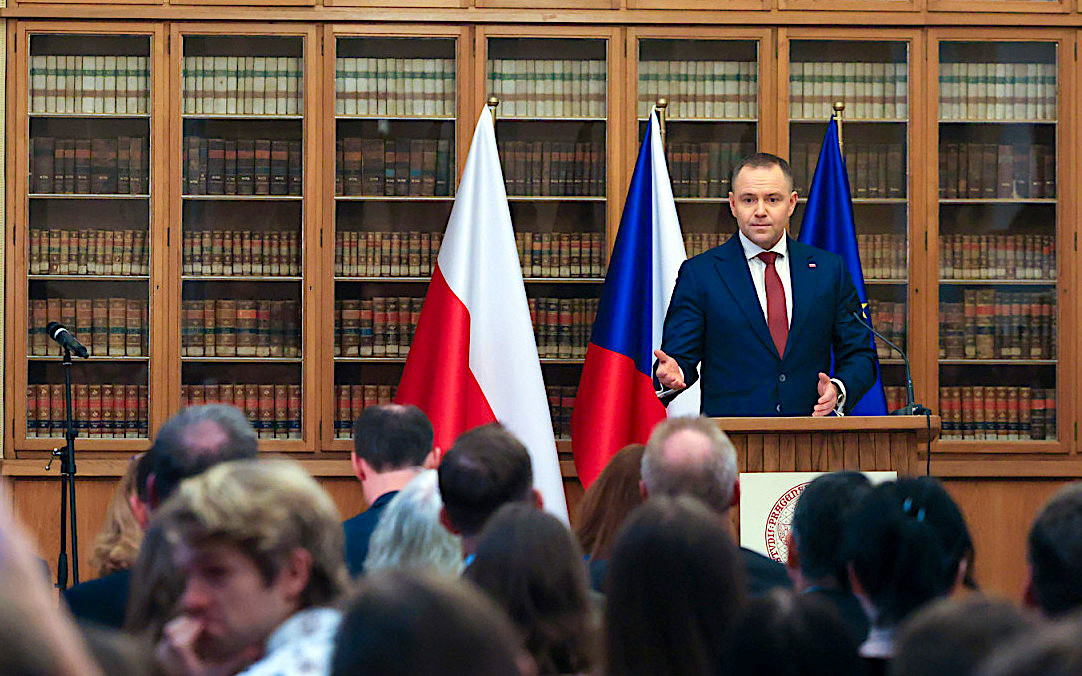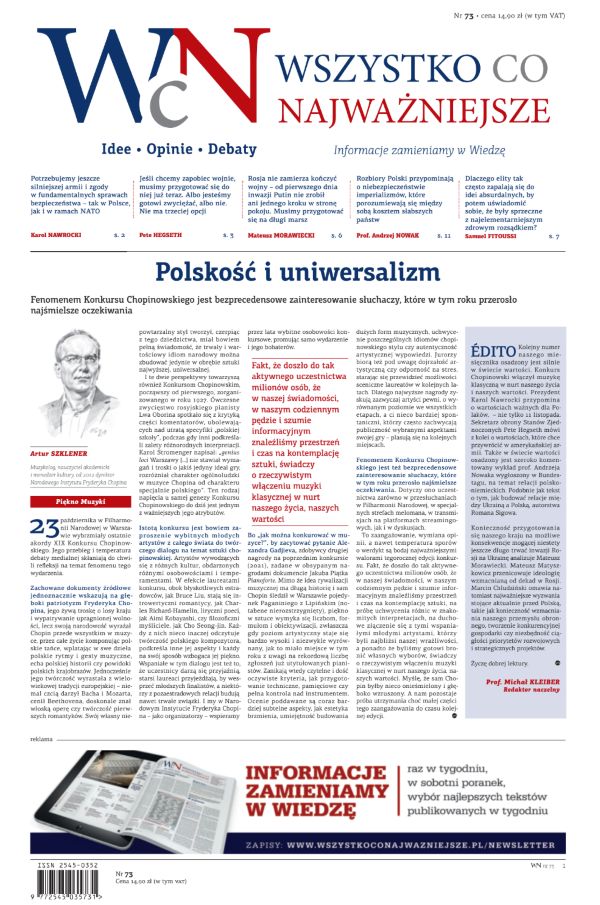
 My vision of the direction in which the European Union should go
My vision of the direction in which the European Union should go
Let me be crystal clear: I am a supporter of Poland in the European Union, but I believe that issues such as political and justice systems, or security are reserved exclusively for the Polish Constitution, the Polish President and the Polish government. Just as they should be for every member state – says Karol NAWROCKI
.Being still newly elected President of the Republic of Poland, and a historian by education, I could not be more privileged to be delivering this speech in the famous Charles University. As the oldest university in our part of Europe, founded in 1348 – with Poland’s Jagiellonian University established in 1364 as second in our region – it stands as a testament of our cultural, scientific and historical attachment to Western Europe. Especially taking into consideration that the oldest university in our common neighbour was created in 1386 in Heidelberg. It is also a proof that the heritage of Central Europe, including our understanding of how the European integration should be manifested, positions us not as “students in the school of European integration”, who can be enlightened by those “older and more experienced”.
We have experienced it, however, throughout our history. Let me just recall one example of how the democratic political system of then Czechoslovakia, between 1918 and 1939, was tragically ended through „professional guidance” of the Western world in the Munich Agreement of 1938.
Some might say that today our region faces yet again similar challenges. And yet again our certain Western partners try to guide us in the one and only right direction. Ukraine and its Armed Forces have been fighting an existential battle against a barbaric aggressor – the Russian Federation – for almost four years now. This is their outside enemy. But they have an enemy inside, too: namely the internal front against the corrupted elites. I sincerely hope they will win both battles primarily because both victories are achievable. History has shown us that Russia – be it Tsarist, Bolshevik or Soviet – can not only be stopped, but also defeated. And every time it was defeated, it brought a wave of political changes to the system. We witnessed it after the Crimean War in the middle of the nineteenth century; the Russo–Japanese War at the beginning of the twentieth century; the First World War and the Polish–Bolshevik war in its aftermath; and the Soviet–Afghan War in the 1980s.
Political history of our region has also shown that the phenomenon of corruption can be stopped, and stopped for good. Countries of the region have had to get rid of it completely on our path to Euro–Atlantic institutions. I am proud to say that we have managed it successfully.
Nevertheless, it does not mean that these institutions are ideal. Today I would like to share with you my take on our own challenges – both internal and external. As for the external ones, they are existential – the reborn Russian neoimperialism. The internal ones, however, may not necessarily be in plain sight.
At first let me stress: the European Union is our natural political environment. But let us be clear about one thing: this is not the Union of our dreams. We joined the European Union, which was supposed to provide us with economic opportunities, and it did. It also gave us a chance to unleash our entrepreneurial potential. We joined the EU to benefit from the Schengen Area, and we are taking advantage of it. However, the goal was not for the European Union to dictate the terms of our political system, our diet, or the upbringing of our children.
There are certain forces at play that aim at creating a more centralized European Union, with federalization used as a camouflage to hide the process. Its essence is to: deprive member states, excluding two largest, of their sovereignty; downgrade their national democracies by being able to outvote them at the EU level thereby taking away their role as „masters of the Treaties”; abolish the principle that the EU has only those competences that the member states have granted in the treaties; and for the EU to grant itself competences by establishing the superiority of EU institutions over the sovereignty of member states.
Contrary to popular belief, Poland – including the conservative camp, to which I proudly belong, is not the enemy of the European Union. We merely oppose the currently dominant political ideals. And just like in any democracy – the opposition is not an enemy of the state, but rather a represenatitve of a programme and a political line different from the dominant one. As a consequence, Poland – like every member state – has its own vision of the EU and is entitled to it. It has the right to strive for the manifestation and adoption of that vision. This is the nature of democracy.
Poland has centuries long experience of operating within a union. We know the weaknesses and threats of such structures, the greatness of which is the will of stronger partners to dominate weaker ones. Therefore, we advocate for the rejection of the project of EU centralization. In matters concerning our political system and the future of Europe, it is presidents, governments and parliaments that have a true democratic mandate, obtained through free elections – not the European Commission and its subordinate institutions, which are unrepresentative of the diversity of European political currents and composed according to ideological criteria.
We are not groundless. We do not just offer a negative message about what we believe is wrong. We do not only complain. We have a positive message to offer: a Polish program for the European Union, the main assumptions of which I would like to now briefly present.
The starting point consists of two fundamental premises: The masters of the Treaties and the sovereigns deciding on the shape of European integration are and must remain the member states, as the only functioning European democracies.
There is no European demos; its existence cannot be decreed or codified, and without a demos, there is no democracy. In the Polish vision of the EU, the only sovereigns remain nation–states – demos understood as communities of citizens of individual EU member states. Modern nations are not tribes torn by atavistic passions for domination over others – as the EU mainstream tries to portray them – but nations with millennia–old traditions, culture, and interests. Attempting to eliminate them – as European centralists would have it – will only lead to conflict and misfortune. Considering the existence of nations and their sovereign states as an evil that must be overcome is another form of a utopian program.
It wasn’t nations that provoked two world wars, but unbridled imperial appetites of various provenances, including national ones—German and Russian. However, wars also broke out not because of „national” ambition. It is difficult to portray the Habsburg monarchy as “nationalistic”. Equally so, the imperialist, atheistic, anti–civilizational, and undoubtedly anti–national communism also started wars and led to disasters.
The second premise: Poles are among the oldest European demoses. We were among the first to cease being just an ethnic nation, originating from a common tribal core or a collection of subjects of the same king, to become a collection of citizens of our own Republic. This Rei Publicae was a country that the ancestors of today’s Poland shared the principle of „free with the free, equal with the equal” with the ancestors of today’s Lithuanians, Belarusians, Ukrainians, and Jews. Poles also have the experience of 123 years of the Polish demos living and operating despite the nonexistence of its statehood. The notion, then, that we would somehow dissolve into a vague European identity; subject to authorities and laws over which we will essentially have no influence; outvoted by the powers that be; dominated by the currently projected centralized EU system; and living under foreign hegemony, is a utopia detached from reality.
As such, having those in mind, in order to stop and, consequently reverse this negative trajectory of the process of EU centralization, Poland proposes the following actions: First, maintaining the principle of unanimity in those areas of EU decision–making, where it currently applies;
Second, maintaining the one–state–one–commissioner principle in the formation of the European Commission, whereby each EU country, even the smallest, must have its own designated commissioner in the EU’s highest administrative body; and at the same time prohibiting the appointment to the highest EU positions of persons without the recommendation of their home country’s government;
Third, the restoration of the presidency to the head of the executive branch of government of the member–state holding the EU presidency at the moment, which means the return to the pre–Lisbon presidency’s nature. As such, Poland also proposes the abolition of the position of President of the European Council. The President of the Council has to be, as before, the president, prime minister or chancellor of his or her country, that is a politician with a democratic mandate and political base, rather than a bureaucrat–official dependent on the support of the EU’s greatest powers. While the rotation of this position gave each member state a periodic dominant influence on the functioning of the European Council, the current system ensures the permanent dominance of the EU’s „central powers” and marginalizes the others. The same applies to the EU Council for Foreign Policy, which is headed by an official dependent on the great powers, and not by the Minister of Foreign Affairs of the country holding the presidency, who has a democratic mandate.
Fourth, basing the voting system in the EU Council in such a way as to eliminate the excessive advantage of large EU countries. To maintain the support of smaller nations for the process of European integration, these nations must have a real influence on decisions;
Fifth, basing the functioning of the EU on pragmatic principles – without ideological pressures – limiting the competences of EU institutions to selected non–ideological areas or challenges, such as: economic development or demographic collapse; thereby reducing the areas of competence of European institutions to those where the chances of being effective are substantial. This means abandoning excessive ambitions to regulate the entire lives or member states and its citizens and the intention of shaping all aspects of politics, sometimes by bypassing or violating the will of the citizens;
Next, in terms of geopolitics: stopping the ambition to compete with the NATO in the security dimension. Over the past three or so decades, the EU’s security policy has not shown effectiveness – in the face of the post–Yugoslav wars, the destabilization in North Africa and the Middle East, or the Russian aggression against Georgia and Ukraine. The current attempt to centralize arms programs within the EU actually serves the interests of the German and French arms industries, directing money from the EU’s joint debt to them, delaying delivery deadlines, disregarding the urgent arms needs of the EU and NATO’s eastern flank, and providing the European Commission with yet another instrument for „disciplining” member states;
Furthermore, rejecting the European Commission’s regulation – the Digital Services Act (DSA). The idea of any censorship is alien to Polish political culture. Already in the late sixteenth century, Grand Chancellor of the Crown and Grand Hetman of the Crown Jan Zamoyski, when asked by Moscow’s envoys of Ivan the Terrible to burn books that portrayed the Kremlin ruler in a negative light, replied, „We here in this Commonwealth neither prohibit nor order the writing of any books.” This is a shared tradition of the Polish–Lithuanian Commonwealth and the Czech Republic. It is not without reason that Franciszek Skoryna, today a symbol of a great Renaissance man for Belarusians, printed his first Bible in the world, written in the Cyrillic alphabet in the Old Belarusian language, here in Prague in 1517, and his other works in Vilnius – the capital of the Grand Duchy of Lithuania;
And finally rejecting the mainstream division of the EU political scene into: on the one hand the enlightened supporters of the constantly deepening integration, and on the other the primitive populists with totalitarian tendencies. The notion that this is the division line of EU’s political scene is ridiculous. It’s divided into the camp of continuity and reform. Since the current system has led us to debt, uncontrolled migration, energy crises, provoked Brexit and exposed us to Russian imperialism – financed for years by the EU core – change is a necessity. The Euroscepticism, therefore, stemmed from the mistakes of the EU mainstream, and its undemocratic nature.
This is, in a nutshell, my vision of which direction the EU should be headed at. One may wonder now: is this possible? There should be no illusions about the chances of these ideas being adopted by the EU. However, submitting such comprehensive programs for improving our Union is the right of every member state.
Let me be crystal clear: I am a supporter of Poland in the European Union, but I believe that issues such as political and justice systems, or security are reserved exclusively for the Polish Constitution, the Polish President and the Polish government. Just as they should be for every member state.
.I understand my role as the President of the Republic of Poland not as someone who questions the presence in the EU, but as a leader who – based on the countries of the region, our sensitivity and emotions, will build a stronger Central Europe within the EU. If any of you find this vision acceptable, and frankly speaking close to your political heart, I am more than willing to continue the conversation. As of now, let it serve as food for thought. Thank you for your attention.
Karol Nawrocki




